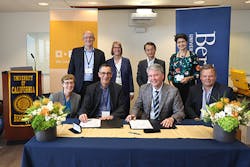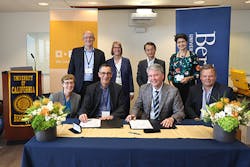BASF California Research Alliance Launches 100 Projects
Dr. Detlef Kratz, designated president, group research, BASF (seated center left) and Prof. Doug Clark, dean, College of Chemistry, UC Berkeley (seated center right) sign agreement extending the California Research Alliance by BASF (CARA) for another five years. From left to right: Prof. Katherine A. Yelick, vice chancellor of research, UC Berkeley; Peter Walther, SVP, catalysis research, BASF; Dr. Kerstin Schierle-Arndt, VP of research for inorganic materials at BASF and associate director of CARA; Prof. Peidong Yang, CARA director, UC Berkeley; Dr. Katrin Friese, VP of process catalysis R&D, BASF; Benjamin Knudsen, designated VP, North America research, BASF
The California Research Alliance (CARA) by BASF leads to 100 research projects between the chemical company and the more than 10 universities that are part of CARA since its establishment in 2014, according to the company. The research projects in the areas of new functional materials, catalysis, chemical synthesis, engineering processes, biosciences, formulations and digitalization, reportedly have generated more than 30 patent applications and nearly 70 peer-reviewed articles. To continue the successful research approach, BASF and the University of California, Berkeley (UC Berkeley) signed a five-year extension of the CARA collaboration at its Spring Review event.
“The continuation of our partnership reinforces the importance of academic collaboration to support industry innovation for BASF,” says Dr. Detlef Kratz, designated president of group Research, BASF SE, in a press release. “At BASF, tackling sustainability challenges requires innovation and collaboration with external partners. As we have seen over the last eight years, the combination of our research power with the strength of the CARA network has led to many sustainability-driven breakthroughs and we are eager to see how they evolve into commercial products in the next years.”
“The open relationship created between BASF scientists and researchers in my group at UC Berkeley, and across the entire UC system, have enabled discussions in many forms,” says Professor John Hartwig, Henry Rapoport Chair, Department of Chemistry, UC Berkeley, in the press release. “These discussions have led both sides to see opportunities for collaborative research on topics we never would have imagined alone and create opportunities to take academic research into new directions with an eye for practical outcomes with a positive effect on sustainability.”
CARA is a multidisciplinary research center, headed by the College of Chemistry at UC Berkeley. Since CARA began, BASF experts and researchers from UC Berkeley, UC San Diego and several other leading universities in California have worked together on multiple research projects to test new materials, evaluate new technologies and explore new processes that will help address key sustainability challenges, according to the company.
Read the entire press release from BASF at www.BASF.com

